This article includes a list of general references, but it lacks sufficient corresponding inline citations .(June 2018) |
Basilius Monner (1500 - 16 January 1566 in Jena) was a German jurist.
This article includes a list of general references, but it lacks sufficient corresponding inline citations .(June 2018) |
Basilius Monner (1500 - 16 January 1566 in Jena) was a German jurist.
Monner joined the Order of Saint Augustine in his youth. He enrolled at the University of Wittenburg [1] at the height of the Reformation. In 1524, Monner became the Rector of the Gotha Gymnasium. He was active in this office for eleven years and graduated with a master's degree in the seven liberal arts in Jena. He later left Jena for the Wittenberg Academy in 1527 due to the plague. [2]
In 1535, Monner began to study law at the Wittenberg University. He travelled to France during this time in 1538 as an envoy of the Protestants, and returned to Wittenberg on October 11, 1538, where he received his doctorate on January 16, 1539. In February 1539 he became a member of the newly-founded Wittenburg Consistory, the first of its kind. The institution was the origin of all evangelical consistories and courts of marriage.
His work in the Consistory, however, was short-lived. On October 10, 1539 he began to counsel Johann Friedrich of Saxony, and became the educator of his sons. With this, he experienced - among other things - the defeat of the electoral line of Ernestine in the Battle of Mühlberg and the Capitulation of Wittenberg. After Monner finished the training of Duke John Frederick II, Duke of Saxony on 30 September 1554, he went to the newly established Gymnasium in Jena as a professor of law in the autumn of 1554.
Here, he worked alongside Gregor Brück, the regent of Saxony. As a participant in the Colloquy of Worms (1557), he experienced the founding of the University of Jena on 15 August 1557. After taking up teaching duties on February 2, 1558, he became one of the first teachers at the faculty of law, along with Matthias Wesenbeck. Monner worked specifically in the area of the Protestant marriage law. He understood how to combine the traditional foundations of the canon law with the new requirements of the Reformation and used the two in order to formulate his beliefs.
As a person, he is described by contemporary witnesses as vain, domineering, zealous, and intriguing. As a religious fanatic of pure Lutheran doctrine, he had supported the opinion of Matthias Flacius primarily as a Gnesio-Lutheran.
Johann Christian Wilhelm Augusti was a German theologian.
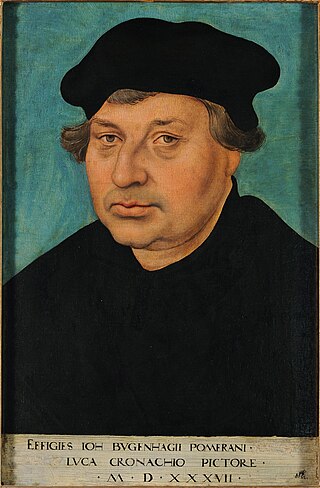
Johannes Bugenhagen, also called Doctor Pomeranus by Martin Luther, was a German theologian and Lutheran priest who introduced the Protestant Reformation in the Duchy of Pomerania and Denmark in the 16th century. Among his major accomplishments was organization of Lutheran churches in Northern Germany and Scandinavia. He has also been called the "Second Apostle of the North".
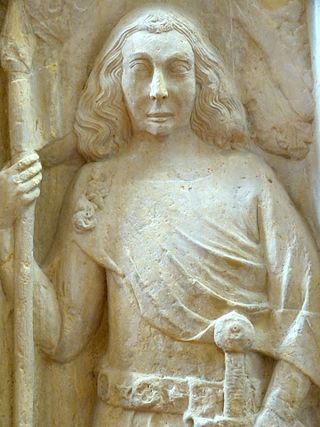
Louis I was ruler of Thuringia from 1123 to 1140.

John Frederick II of Saxony, was Duke of Saxony (1554–1566).

Hermann II was the Landgrave of Thuringia and the son of Louis IV, Landgrave of Thuringia, and Saint Elizabeth of Hungary.
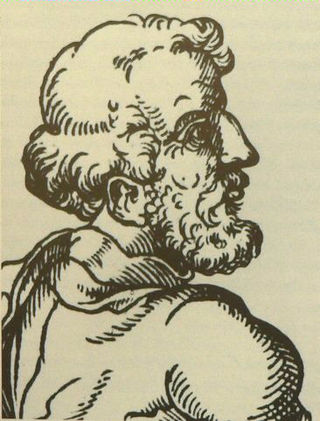
Jacob Micyllus, was a German Renaissance humanist and teacher, who conducted the city's Latin school in Frankfurt and held a chair at the University of Heidelberg, during times of great cultural stress in Germany.
Jacob Caro was a German historian.
Viktorin (Victorinus) Strigel was a Philippist Lutheran theologian and Protestant reformer.

Georg Cracow, Kraków, Cracov, Cracau or Cracovius was a German lawyer and statesman.
Peter Agricola was a German Renaissance humanist, educator, classical scholar and theologian, diplomat and statesman, disciple of Martin Luther, friend and collaborator of Philipp Melanchthon.
Heinrich Schmidt was a German archivist, naturalist, philosopher, professor and a student of Ernst Haeckel.

Johann Friedrich Mayer was a German Lutheran theologian and professor of theology at Wittenberg University. He was an important champion of Lutheran orthodoxy and General Superintendent of Swedish Pomerania.

Louis III, nicknamed Louis the Pious or Louis the Mild was a member of the Ludowingians dynasty who ruled as Landgrave of Thuringia from 1172 until his death.
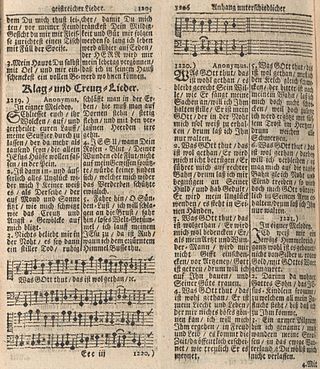
"Was Gott tut, das ist wohlgetan" is a Lutheran hymn written by the pietist German poet and schoolmaster Samuel Rodigast in 1675. The melody has been attributed to the cantor Severus Gastorius. An earlier hymn with the same title was written in the first half of the seventeenth century by the theologian Michael Altenburg.
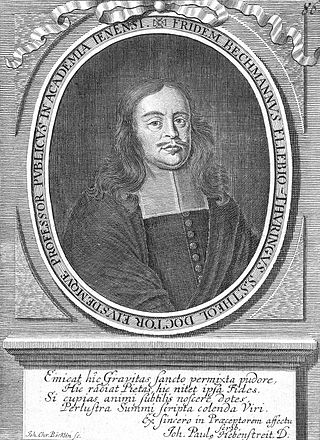
Friedemann Bechmann was a German Lutheran theologian.

The Jenaer Liederhandschrift is a 14th-century manuscript containing lyrics and melodies to songs in Middle High German. The majority of the lyrics belong to the genre of Spruchdichtung and, with 91 melodies, the manuscript is the single most important source for the music of this genre.

Colmar Grünhagen was a German archivist and historian. Almost all of his considerable published output concerns the History of Silesia.
Klara Griefahn was a Jewish medical doctor who committed suicide in 1945 to avoid deportation by the Nazis. A number of memorials to Greifahn can be found in Jena, Germany.

The Ernestine Gymnasium is a humanistic and modern gymnasium in Gotha, Germany, the successor of the Illustrious Gymnasium, founded in 1524, which in 1853 was merged with the recently founded Real-Gymnasium Ernestinum, named in honour of Ernest I, Duke of Saxe-Coburg and Gotha. The merged school continued to be known as the Ernestinum. Until 1947, when it was closed, it was considered the oldest gymnasium in the German-speaking world. It was re-founded in 1991, shortly after German reunification.
Christian Johann Christoph Schreiber was a German theologian, philologist, philosopher, and poet. He was also the Superintendent of the dioceses of Lengsfeld and Dermbach. He was connected in friendship or correspondence to writers and philosophers of his time, and published poetry, sermons, historical and philosophical works.